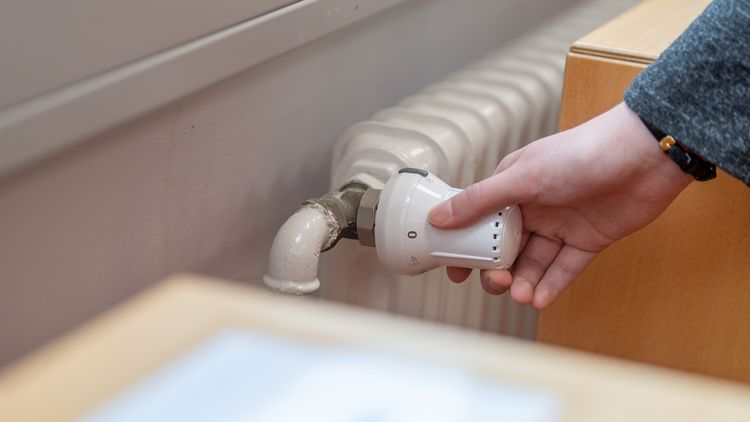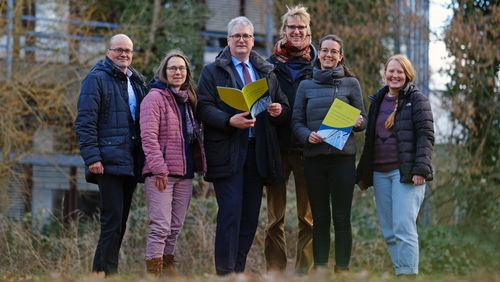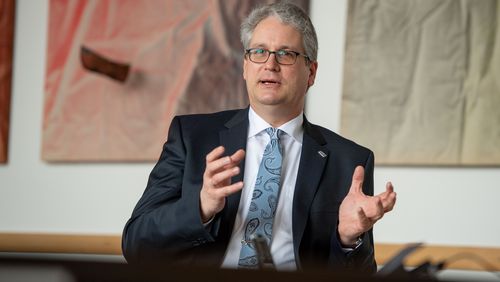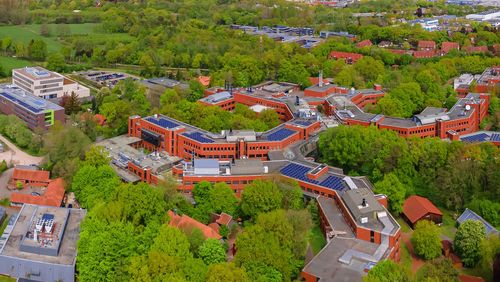Energy saving tips for the University of Oldenburg
Use electricity and heat as economically as possible – if we can do that, we will get through the winter well on campus. Everyone can contribute to this. Tips for the office, the seminar room, the laboratory and the kitchenette.
In the office
- Shock ventilation instead of continuous ventilation: The best way to get fresh air into the room is to open the window fully for five to ten minutes several times a day rather than leaving it ajar the entire time.
- Reached the end of the working day? Remember to lower the heating temperature in the evenings and at weekends (set the thermostat valve to 1 or 2).
- Keep the heating elements in the office as free from office furniture or other obstacles as possible so that the air can circulate well; the maximum temperature for offices is 19 degrees Celsius and is regulated centrally (for every degree less, about 6 percent more heating energy is saved).
- Remember to close the door. This keeps the heat in the room.
- Is the sun shining and is it bright enough? Then use the daylight and switch on the light only when needed.
- Remember to switch off electrical appliances that are not needed and to avoid stand-by.
- If you buy new appliances, please make sure that they consume as little energy as possible.
- (Mobile) electric heating, cooling and air-cleaning devices are power guzzlers and are not allowed to be used.
- Getting in motion is good for you: If possible, take the stairs and not the lift.
In the laboratory (air-conditioned)
- Reached the end of the working day? Remember to lower the heating temperature in the evenings and at weekends (set the thermostat valve to 1 or 2).
- Keep the heating elements in the lab as free from obstacles as possible so that the air can circulate well.
- The sun is shining and it is bright enough? Then why not use the daylight and switch on the light only when needed.
- Disconnect all small electrical appliances that are not needed from the power supply.
- If you buy new appliances, please ensure that they consume as little energy as possible.
- (Mobile) electrical heating, cooling and air-cleaning devices are power guzzlers and may only be used for research purposes.
- Close the windows and doors as much as possible so that the room temperature remains the same.
- Do not cool the room more than necessary. If you can do without daylight, then simply lower the sunshade when the outside temperature is higher.
- Is there little in your workgroup's cooling unit at the moment? Coordinate with neighbouring workgroups; it may be possible to temporarily share freezers, cold rooms or -80-degree freezers, for example. Every appliance that is switched off saves electricity.
- Remember to close the drawer fronts of extractor hoods completely when in use. And – don't forget: Turn off the extractor when you're not using it.
- In laboratories that are not in use, switch off the room air conditioning if possible or inform Divison 4 at energiesparen@uol.de.
- Getting in motion is good for you: If possible, take the stairs and not the lift.
In the seminar room
- Shock ventilation instead of continuous ventilation: The best way to get fresh air into the room is to open the window fully for five to ten minutes several times a day rather than leaving it ajar the entire time.
- Is your lecture the last of the evening or before the weekend? Remember to lower the heating temperature (set the thermostat valve to 1 or 2).
- Keep the heating elements as free from furniture or other obstacles as possible so that the air can circulate well; the maximum temperature is 19 degrees Celsius and is regulated centrally (for every degree less, about 6 percent more heating energy is/are? saved).
- Is the sun shining and is it bright enough? Then thank you for using the daylight and switching on the light only when needed.
- Remember to switch off electrical appliances that are not needed and to avoid stand-by.
- Thank you for closing windows and doors as much as possible so that the heat stays in the room.
- Getting in motion is good for you: If possible, take the stairs and not the lift.
In the kitchenette
- Are you the first member of your department to arrive at the university in the morning? It would be nice if you could air out the kitchenette once for five to ten minutes in addition to your office.
- Does your staff kitchen really need to be heated? Set the thermostat valve to 1, that should be enough.
- Is the sun shining and is it bright enough? Then why not use the daylight and only switch on the light when needed.
- Remember to switch off electrical appliances that are not needed and to avoid stand-by.
- If you buy new appliances, make sure they consume as little energy as possible.
- Set the fridge temperature to eight degrees Celsius. This is sufficient for food.
- Your department's fridge is only half full? Consult with others, it may be possible to share a fridge with another organisational unit.
- Make sure to decalcify the kettle regularly, so it uses less electricity.
- Fill the dishwasher as completely as possible and do not let it run when it is still half-empty. If your dishwasher has an Eco programme, please use it (if necessary, use the standard programme once a week for hygiene reasons).
The heating element, the lamp or the thermostat is defective? The tap in the washroom is dripping? Then feel free to contact Division 4 – Facility Management.
Do you have ideas on how the university could save even more energy? Feel free to send an email to energiesparen@uol.de.
Topics
- Astronomy
- Biology
- Botanical garden
- Chemistry
- Computing Science
- Cooperations
- Covid
- Culture
- Dutch Studies
- Early Career
- Economics
- Educational Sciences
- Energy
- Energy Research
- Environmental Sciences
- Equal opportunities
- German Studies
- Graduate academy
- Health Services Research
- Higher Education Policy
- History
- Human Medicine
- International affairs
- Marine Sciences
- Material Culture
- Medical ethics
- Medical Physics and Acoustics
- Music
- Neuroscience
- People
- Philosophy
- Physics
- Presidential Board
- Psychology
- Research
- Slavic Studies
- Social Sciences
- Special Needs Education
- Sport Science
- Study Affairs
- Sustainability
- Teacher Education
- Theology
- Transfer
- University Medicine
- Ukraine
- Wind Physics






